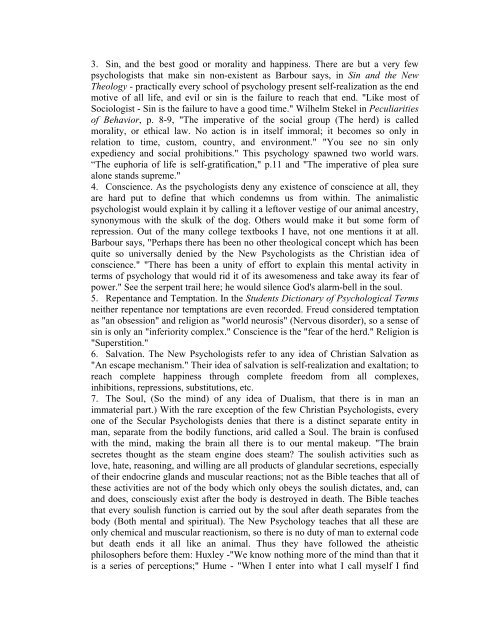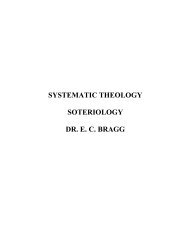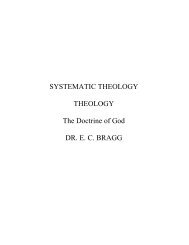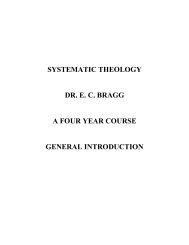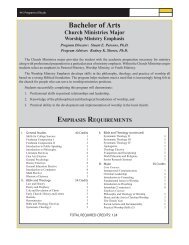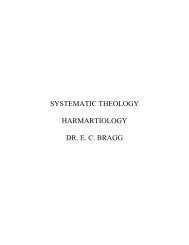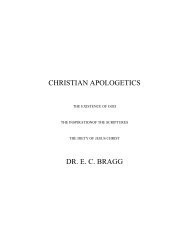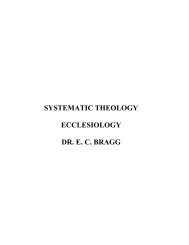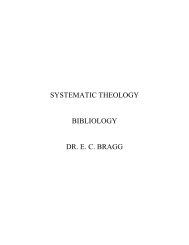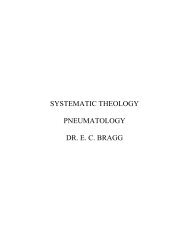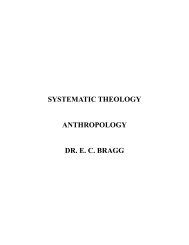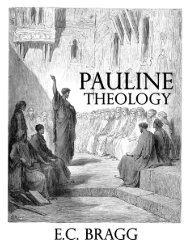CHRISTIAN PSYCHOLOGY DR. E. C. BRAGG - Trinity College
CHRISTIAN PSYCHOLOGY DR. E. C. BRAGG - Trinity College
CHRISTIAN PSYCHOLOGY DR. E. C. BRAGG - Trinity College
Create successful ePaper yourself
Turn your PDF publications into a flip-book with our unique Google optimized e-Paper software.
3. Sin, and the best good or morality and happiness. There are but a very few<br />
psychologists that make sin non-existent as Barbour says, in Sin and the New<br />
Theology - practically every school of psychology present self-realization as the end<br />
motive of all life, and evil or sin is the failure to reach that end. "Like most of<br />
Sociologist - Sin is the failure to have a good time." Wilhelm Stekel in Peculiarities<br />
of Behavior, p. 8-9, "The imperative of the social group (The herd) is called<br />
morality, or ethical law. No action is in itself immoral; it becomes so only in<br />
relation to time, custom, country, and environment." "You see no sin only<br />
expediency and social prohibitions." This psychology spawned two world wars.<br />
“The euphoria of life is self-gratification," p.11 and "The imperative of plea sure<br />
alone stands supreme."<br />
4. Conscience. As the psychologists deny any existence of conscience at all, they<br />
are hard put to define that which condemns us from within. The animalistic<br />
psychologist would explain it by calling it a leftover vestige of our animal ancestry,<br />
synonymous with the skulk of the dog. Others would make it but some form of<br />
repression. Out of the many college textbooks I have, not one mentions it at all.<br />
Barbour says, "Perhaps there has been no other theological concept which has been<br />
quite so universally denied by the New Psychologists as the Christian idea of<br />
conscience." "There has been a unity of effort to explain this mental activity in<br />
terms of psychology that would rid it of its awesomeness and take away its fear of<br />
power." See the serpent trail here; he would silence God's alarm-bell in the soul.<br />
5. Repentance and Temptation. In the Students Dictionary of Psychological Terms<br />
neither repentance nor temptations are even recorded. Freud considered temptation<br />
as "an obsession" and religion as "world neurosis" (Nervous disorder), so a sense of<br />
sin is only an "inferiority complex." Conscience is the "fear of the herd." Religion is<br />
"Superstition."<br />
6. Salvation. The New Psychologists refer to any idea of Christian Salvation as<br />
"An escape mechanism." Their idea of salvation is self-realization and exaltation; to<br />
reach complete happiness through complete freedom from all complexes,<br />
inhibitions, repressions, substitutions, etc.<br />
7. The Soul, (So the mind) of any idea of Dualism, that there is in man an<br />
immaterial part.) With the rare exception of the few Christian Psychologists, every<br />
one of the Secular Psychologists denies that there is a distinct separate entity in<br />
man, separate from the bodily functions, arid called a Soul. The brain is confused<br />
with the mind, making the brain all there is to our mental makeup. "The brain<br />
secretes thought as the steam engine does steam? The soulish activities such as<br />
love, hate, reasoning, and willing are all products of glandular secretions, especially<br />
of their endocrine glands and muscular reactions; not as the Bible teaches that all of<br />
these activities are not of the body which only obeys the soulish dictates, and, can<br />
and does, consciously exist after the body is destroyed in death. The Bible teaches<br />
that every soulish function is carried out by the soul after death separates from the<br />
body (Both mental and spiritual). The New Psychology teaches that all these are<br />
only chemical and muscular reactionism, so there is no duty of man to external code<br />
but death ends it all like an animal. Thus they have followed the atheistic<br />
philosophers before them: Huxley -"We know nothing more of the mind than that it<br />
is a series of perceptions;" Hume - "When I enter into what I call myself I find


